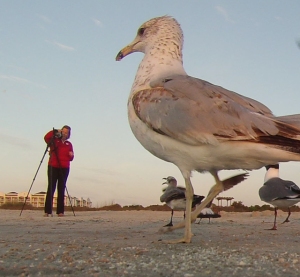Posts tagged ‘Dominant/submissive relationships’
Relationships Need to be Two-way Streets
Relationships need to be two-way streets. We’ve all been in relationships which were one-way streets, and they’re excruciating.
The two people in any relationship will always feel committed and involved at different levels. When one person is forty percent into the relationship, and the other person is sixty percent into the relationship, it might feel lopsided, and observers might see that one gives more than the other, but the relationship probably will still work. If the discrepancy gets much higher than that, though, the power imbalance gets too unwieldy. The person with the greater power often becomes controlling, and the person with the lesser power often becomes controlled, and then we have got some problems.
Virginia Satir, the Mother of Marriage and Family Therapy, called these two roles the dominant and the submissive. No healthy relationship can be based on dominant and submissive stances. The dominant person can be a person of either gender. Dominant/submissive imbalances are found in heterosexual as well as homosexual partnerships.
The dominant person has too much control and too much responsibility. The submissive person has too little power and too little responsibility, because with power comes responsibility. Control means that we have power over another person. Power means we have control over ourselves.
Virginia Satir used pictures to demonstrate what these power imbalances looked like. The dominant person often towered over the submissive person. The dominant person often stood with feet wide apart, hands on hips, and/or a finger pointed at the submissive person. The face of the dominant person was usually angry. The submissive person was often pictured down on his or her knees, looking up at the dominant person with an expression of fear and supplication on his or her face. The message from the submissive mouth was, “Don’t hurt me.”
Specific illnesses seem more likely to accompany dominance and submission, too. The dominant body is rigid and hyper-extended. The submissive body is curved in on itself and unable to take a full, deep breath. The dominant body seems poised for a stroke. The submissive body seems to be poised to be striken.
One of Virginia Satir’s major themes was self-esteem. She believed poor self-esteem to be the cause of most human problems. When we have poor self-esteem, we believe ourselves to be better than others are, and therefore entitled to dominate, or less than others are, and therefore relegated to submission. People with healthy self-esteem are never haughty or superior. They know they are no better than any other creature on the earth. They also know they are not inferior to any creature on the earth. High and healthy self-esteem is the knowledge that, “All (men and women) are created equal and endowed with certain inalienable rights.” Those with healthy self-esteem know that they are endowed with certain inalienable responsibilities, also.
Let me be completely black and white. I rarely resort to absolutes, but this is an absolute: Anyone who is dominant and controlling over another human being has low self-esteem. I would love to say that anyone who allows control and dominance also has low self-esteem, but this is simply not true. There are many extenuating circumstances under which peoples’ power and control of their own destinies are taken away. All bullies and despots have low self-esteem. Not all victims and submissive people have low self-esteem.
Like so many other human attributes, it is sometimes difficult to tell just how healthy someone’s self-esteem is. People fake bad, and people fake good. Plus, we are pre-disposed to assume people in powerful positions must have personal power. We are also predisposed to think that educated people must feel good about themselves. None of this is true.
What is it that causes people to feel good about themselves all their lives, and what is it that makes it difficult for people to feel good about themselves ever in their lives? Yes. Adequate v. inadequate parenting. Before the age of five we are either equipped with the resiliency and resources to feel adequate to life, or we are not. If we don’t feel adequate to life, we will assume one of two positions: dominance or submission.
You have heard the phrase that opposites attract, right? What that really means is that dominant people can sniff out submissive people like pigs can find truffles and German Shepherds can find drugs. Submissive people, who feel inadequate on their own, can also sniff out the bullies and the posers. Matches made in heaven? Not so much.
Dominant/submissive relationships are the original one-way streets. The submissive person gives more, and the dominant person takes more. Interestingly, many dominant people are quite benign as long as the submissive person keeps giving and never questions the control. In extreme cases this leads to things like kidnapped victims falling in love with their kidnappers. Going along with the control and dominance becomes so necessary for safety that the victim stops resisting altogether and begins to feel grateful to the abuser. The more devotion and gratitude the submissive person can muster, the safer life becomes, and the more grateful the victim actually is. At some point, this can translate into “love.”
One more interesting point Virginia Satir makes about dominant/submissive relationships is that should the submissive person become empowered for some reason, often financial turns of fortune, or the dominant person become dependent on the submissive person, often a health crisis, instead of both trying to take the opportunity to learn a more equitable way of interacting, what is more likely to happen is that they will switch roles, and the dominant person will take the submissive role and the submissive person will begin to dominate the relationship.
In a two-way street relationship both partners give, and both partners take. Both negotiate the choices and decisions to be made. Each is responsible for his or her own happiness. The word psychologists use for this type relationship is “interdependent.” The partners are not independent of each other, which means each operates separately. The partners are not dependent, which means one or both can’t get along without the other. Instead, this healthier interdependent stance is like a three legged race: each brings one strong leg to the race and they cooperate by using their second leg to work together.
- Scott Peck writes about this healthy relationship formula in The Road Less Traveled. The metaphor he uses is of two mountain climbers. They establish a base camp together, and each has his or her roles and duties in the maintenance of the base camp. It is “theirs.” They go back to base camp at night. During the day, however, each partner climbs his or her own mountain. The mountain belongs to them individually. Their lives are a dance between the separateness of the mountain climbing and the unity of the base camp. Each may have a preference for one portion of life over the other, the separate or the shared, but both have chosen to negotiate the balance of including both strong elements.
We’ve been talking about significant other relationships, but these ideas apply to all relationships.
Parents who expect nothing of their children create brats. Children who are given things, time, attention, love, warm beds, delicious food, toys and games and treats, must give things back. What they give back needs to include gratitude, respect, chores, doing their job well – school—treating their siblings kindly, feeding the dog, and whatever age appropriate things kids can do to help with the base camp – home! Parents who make excuses for why their children are not respectful team players are setting their children up for a life of irresponsibility and blaming of others when self-discipline was what was needed.
Just a personal comment here: I have unfortunately learned a great deal about being a parent since my children have grown up. If I had it to do over again, my children would have had many more rules and standards. In my thirty years as a therapist, I have never encountered a child raised by strict parents who didn’t turn out to be a productive and pleasant citizen. I have met too many children raised by overly indulgent parents who grew up believing they were entitled to be spared natural consequences. If you are reading this and have children in your home, toughen up. Be fair. Be consistent. Make family life a two-way street.
Friendships, also, need to be two-way streets. If you find yourself doing most of the work to preserve a friendship, stop. See how long it takes for your friend to text or email or call. Sometimes I’ll find myself thinking, “I should really call this friend.” Then I’ll catch myself and remind myself that this friend can call me, too. On the other hand, we have to be sensible about this. One of my friends does all the calling because she lives in a house with seven other people. My chances of catching her at a good time are much more slim than hers of catching me when I can talk. We both understand this and understand why she gets to choose when we talk.
A mention, too, about the inequity of reciprocity: I remember a short Chinese poem that I read forty years ago which said, “You gave me a persimmon, and I gave you a flute. We celebrated our friendship.” (That is a bad paraphrase, but the idea is so true.) It is not that we give the same things or the same cost of things or the same number of things, whether they be material or non-material items. What matters is that we both give from our hearts what the other will value and treasure.
I deeply value Mary Ellen’s enhancement of the blog with photos and colored type and bold words and lovely organization. She says she values that I talk about things which help her and some of her family and friends to live more enriched and more meaningful lives. We each feel the other offers something of value. This is a relationship which is a two-way street.
Blessings, courage and love fill your hearts and souls – Susan
More support







